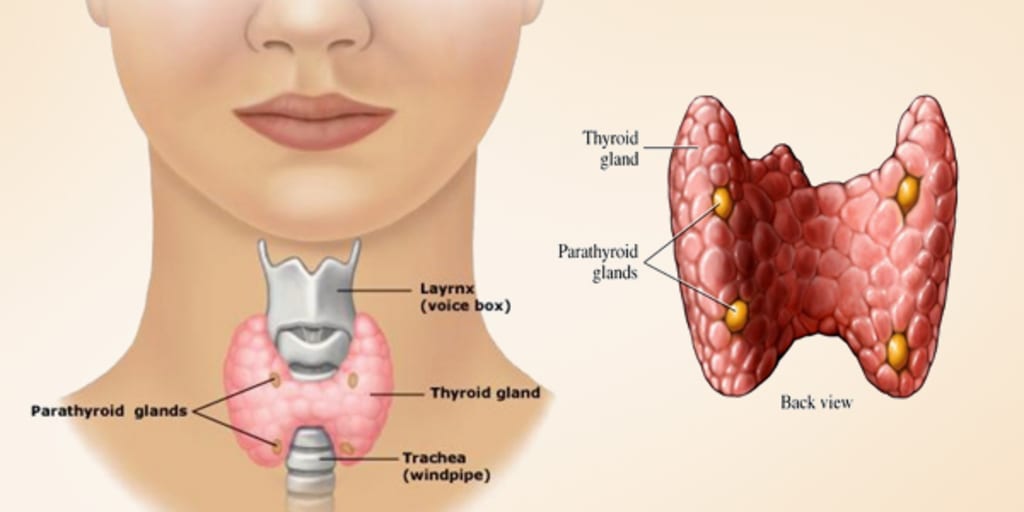
The thyroid has one major function within the body's immune system, and it is in control of the body's metabolism. Metabolism is the conversion of oxygen and calorie energy.
And to do this, the thyroid gland must produce thyroid hormones. This is the same hormone that causes all the cells in the body to increase their cellular functions. Throughout this article, I will discuss how thyroid hormones are produced and common thyroid problems.
The thyroid is the largest gland in the neck. It is located in the outer part of the neck under the skin and muscles, in an area known as "Adams Apple". It has a butterfly shape and its wing-shaped part, called lobes, wraps around each side of the trachea.
Each lobe is connected to a narrow group of thyroid cells, called the isthmus. The thyroid gland, although the largest gland in the neck, is also one of the smallest glands in the body, weighing less than a ton. The proper function of the thyroid gland is to take iodine, which is found in many foods, and to convert it into thyroid hormone.
Two thyroid hormones are produced by Thryoxine (T4), and triiodothyronine (T3). Thyroid cells are the only cells that can absorb iodine from the body. They combine with the amino acid Tyrosine to form T3 and T4. They are then processed into the bloodstream where they are transported throughout the body to regulate metabolism. Thyroid cells are important in the body's function, because each cell follows thyroid cells for metabolic control.
Thyroid problems are very common in today's society. There are four main stages in which you will experience thyroid problems:
Hormone production
Problems caused by increasing the growth of the thyroid gland in the neck
It causes stress on important structures in the neck.
Formation of nodules or bumps within the thyroid
Prostate cancer of the thyroid
When hormones control our metabolism, they control many things, such as how many calories we burn, how much we feel warm, and how much we weigh. It also has a direct effect on the body's organs, such as the heart, which beats even faster under the influence of hormones. In a healthy person, the thyroid gland produces the right amount of T3 and T4 that the body needs to regulate metabolism.
Hyperthyroidism is a condition caused by an overactive thyroid gland, which means that the thyroid gland secretes many hormones. There are many different causes of hyperthyroidism, but most of the symptoms are the same. Some of these symptoms include shortness of breath, insomnia, fatigue, light or irregular menstrual cycles, heat intolerance, and panic attacks. Thyroid cancer is when bumps or bulbs form inside the thyroid itself.
We can therefore conclude that improper production of thyroid hormones within the thyroid endocrine protection, can cause many problems such as cell division, growth and metabolism.
Thyroid problems are some of the common diseases that can affect the human body. The thyroid is an endocrine gland and produces important hormones such as thyroxin. The hormones produced by the thyroid gland are very important for the body's metabolism. Hypothyroidism, hyperthyroidism and tumors are the most common thyroid problems. Symptoms associated with thyroid problems appear slowly, so they are often misdiagnosed.
Underactive thyroid gland or hypothyroidism is mainly caused by Hashimoto's thyroiditis. This thyroid problem is more common in women. The reason for this is incorrect information. In it, the body's immune system attacks the thyroid gland.
Obesity, apathy, heat and cold, and loss of consciousness are just some of the common symptoms associated with hypothyroidism. Those diagnosed with hypothyroidism have low thyroxine. The treatment is mainly used with a pill of thyroid hormones. Medicine is often a lifelong commitment, in varying degrees.
In hyperthyroidism, thyroxine levels are very high and are mainly caused by Grave's disease. Middle-aged women are exposed to this thyroid problem. Weight loss, heart palpitations, fatigue, irregular bowel movements, panic attacks, and irritability are common symptoms. Because the symptoms appear to be delayed, they are usually not detectable. Blurred vision and double vision are symptoms found in some patients.
Radiation iodine is the main treatment given for hyperthyroidism. With this treatment, part of the thyroid gland is depleted to reduce the amount of thyroxine produced. Under the active gland are the main side effects of this treatment. Medications used to treat thyroid problems greatly reduce thyroid function. Drugs for hyperthyroidism often have serious side effects.





Comments (1)
Your findings about the thyroid's involvement in metabolism were eye-opening. I had no clue such a little gland could have such a large influence on our entire health. I also appreciate the practical advice you provided on preserving thyroid health. https://cvithyroidcenter.com/thyroid-cyst-pea-aspiration-ablation/